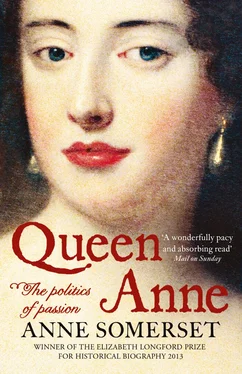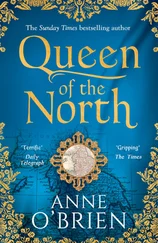Great care was at least taken over Anne’s religious education. When she returned to England from France in 1670, her father was already gravitating towards Catholicism. Fully aware it would cause political meltdown if Anne and Mary did likewise, Charles II saw to it that both his nieces were brought up as Protestants. James resented this, recalling bitterly ‘it was much against his will that his daughters went to church and were bred Protestants’, but it was made clear to him that if he ‘endeavoured to have them instructed in his own religion … they would have immediately been quite taken from him’. 59
James was particularly irked by the choice of Henry Compton to be his daughters’ spiritual preceptor. Compton came from an aristocratic family and had not been ordained until after the Restoration, when he was already in his thirties. Before that he had seen active service in the royalist army, and he still had such a soldierly manner that James complained he spoke ‘more like a colonel than a bishop’. He was militant in other ways, for he was a known ‘enemy to the Papists’, 60and as Compton’s influence at court grew, James had many clashes with him. He could not prevent him becoming a Privy Councillor in January 1676, but a year later the Duke did succeed in blocking the then Bishop of London’s appointment as Archbishop of Canterbury.
Compton was not just intolerant towards Catholics, for he was also ‘very severe upon the dissenting Protestants’. This hostility helped Anne form the idea that nonconformists were fanatical and untrustworthy. ‘As she was bred up in High Church principles, they were believed to be always predominant in her’, and all her life she was of the view that the Anglican Church needed protection against the dissenters. 61
Compton, known for his low, gruff voice, was not a particularly inspiring teacher, but his advocacy of unquestioning faith in preference to intellectual rigour was an approach that suited Anne. After marrying and going to live in Holland, her sister Mary came to feel that her spiritual education had been defective, and she set about compensating for this by intensive study. When her father later sought to convert her by sending her Catholic tracts, he was astounded by the learned way she marshalled arguments against him. Had Anne been called upon to do so, it is unlikely that she could have acquitted herself so competently. In 1687 she did commend to her sister some of the religious works currently being published in England, declaring ‘a great many of our side … are very well writ’, but in general she ‘never pursued any study in those points with much application’. 62
If complex theological debate was beyond Anne, her Anglican faith was firm and undeviating. ‘In all respects a true daughter of the Church of England’, she was a ‘devout worshipper’ who was ‘steadfast and regular in her devotions’. As well as setting aside time for private prayer, she assiduously attended church services and took the sacrament whenever appropriate. At the height of their friendship, almost the only thing that prompted her to criticise Sarah Churchill was Sarah’s infrequent church attendance. 63Anne’s religion consoled and sustained her when she endured tragedies and bereavements that might have caused others to lose their trust in God.
When Anne’s faith was called in question, she reaffirmed it in simple and positive terms which not only left no doubt as to the strength of her convictions but also made clear the extent to which she had absorbed the anti-Catholic sentiments of Bishop Compton. She told Mary in 1686:
I abhor the principles of the Church of Rome as much as it is possible for any to do, and I as much value the doctrine of the Church of England. And certainly there is the greatest reason in the world to do so, for the doctrine of the Church of Rome is wicked and dangerous and directly contrary to the scriptures, and their ceremonies – most of them – plain downright idolatry. But God be thanked, we were not bred up in that communion, but are of a Church that is pious and sincere, and conformable in all its principles to the scriptures. Our Church teaches no doctrine but what is just, holy and good, or what is profitable to salvation; and the Church of England is, without all doubt, the only true Church. 64
A Venetian diplomat recorded that ‘The Duchess of York was not buried when negotiations were begun for a fresh one’. James’s eagerness to acquire a new spouse was partly because he wanted sons and heirs. It took him some time to find a bride, not least because he was adamant that candidates must be ‘young and beautiful’. 65At length he decided to propose to an Italian princess, fifteen-year-old Mary Beatrice of Modena, who fulfilled both requirements. Negotiations dragged on because the girl had wanted to be a nun and it required the intervention of the Pope to persuade her that marriage to James represented a higher vocation. In September 1673 Mary Beatrice was wedded to James by proxy at a ceremony in Modena, but when news arrived in England that James had chosen a Catholic princess as his wife it was very ill received. After Parliament met on 20 October, a motion was passed urging that Mary Beatrice should be sent straight home on reaching England. Rather than heed these demands, Charles II prorogued Parliament before her arrival in November.
‘The offspring of this marriage will probably inherit the crown’, the Venetian ambassador noted, but there is no evidence that the likelihood of being superseded in the succession by Mary Beatrice’s sons upset Mary and Anne at this stage. Certainly their father assumed they would welcome their young stepmother, jovially telling eleven-year-old Mary ‘he had provided a playfellow for her’. 66
Once she had recovered from her homesickness and her initial distaste for her middle-aged husband, Mary Beatrice’s youthful high spirits manifested themselves. There had been fears that someone of her ‘Italian breeding’ would have very pronounced ideas about etiquette, but here too her informality came as a pleasant surprise as she enjoyed games of blind man’s buff and snowball fights. Lady Tuke said she would never have expected her to be ‘such a romp as she proves’. 67
Initially the signs were that Mary Beatrice had established an excellent relationship with her stepdaughters. In 1675 an observer reported she ‘diverts herself … with the princesses, whose conversation is much to her taste and satisfaction’. Three years later she would say of Mary, ‘I love her as if she was my own daughter’, and she gave every indication of being equally fond of Anne. When the Duchess of York accompanied her husband to Scotland in 1680 she complained not just about having to leave behind her own daughter Isabella, but also at being parted from Anne. The following year Mary Beatrice expressed delight when her stepdaughter was permitted to join her at Edinburgh, declaring herself ‘much pleased to have the Lady Anne with me’. 68Anne was assumed to reciprocate these warm feelings, and in the early years it is indeed probable that they were genuinely on good terms. In time, however, Anne would come to detest Mary Beatrice.
The fact that Mary and Anne were being brought up in a Catholic household was a cause of concern to the public. When Parliament met in February 1674 the House of Lords attempted to pass a resolution that called for ‘the removal of the Duke of York’s daughters from his charge because the Duchess is a Catholic’. 69Once again the King staved off trouble by proroguing Parliament before the measure was put to the vote.
Considering she was not even allowed to bring up her own children as Catholics, Mary Beatrice’s chances of converting her stepdaughters were surely slim. Having given birth in January 1675 to a baby girl (dismissed as ‘but a daughter’ by the disappointed father) she was appalled when her husband explained that ‘their children were the property of the nation’, and would be removed from their parents’ care unless raised as Protestants. Accordingly the child (who died that October) was christened according to Anglican rites, and her elder sisters stood as godmothers. 70
Читать дальше












